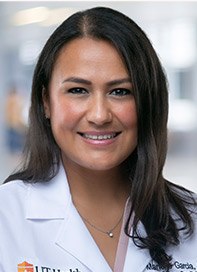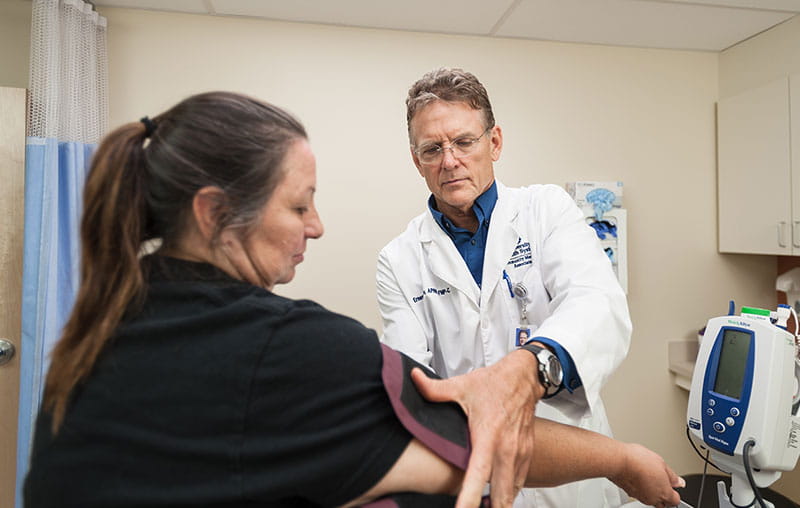Coronary artery disease (CAD) is the most common type of heart disease among people in the United States. According to the Centers for Disease Control and Prevention (CDC), approximately 1 in 20 adults have the disease.
It’s caused by plaque buildup in the coronary arteries, which carry blood to the heart. As plaque builds up in those essential blood vessels, it can cut off blood flow, leading to a heart attack.
While many people in the U.S. are living with coronary artery disease, this plaque buildup can sometimes be severe and even cause serious blockages.
Dr. Marlene Garcia, an interventional cardiologist with University Health Cardiovascular Center, says staying on top of your heart health can help prevent CAD.
What Are the Warning Signs of Clogged Arteries?
Coronary artery disease is what health experts call a “silent disease.” That means it usually develops without causing any noticeable symptoms, making it particularly dangerous. The CDC notes that the first sign of CAD is often a heart attack caused by the buildup of plaque in the arteries.
While the disease is most often silent, Dr. Garcia says to pay attention to how you feel as you go about your day, including when you’re moving around and when you’re at rest. You may notice some subtle symptoms that plaque is building up.
Symptoms suggestive of CAD include:
- Angina, which is chest pain or discomfort
- Easier fatigue when exercising
- Shortness of breath
Women and individuals with long-standing diabetes may have more subtle symptoms such as back pain with exertion, neck or jaw pain and intense fatigue.
If a blockage cuts off blood flow to the heart, it can lead to a heart attack, so it’s important to know those symptoms as well. In addition to the symptoms noted above, symptoms of a heart attack can include:
- Cold sweats
- Lightheadedness
- Nausea
- Pain or discomfort in the arms, shoulders, neck or abdomen
- Weakness
If you experience these symptoms, call 911. While on your way to the nearest emergency department, your care team can start treatment.
What Are the Risk Factors for Developing Coronary Artery Disease?
While anyone can develop CAD at any age, it’s most common among women after menopause and men age 45 and older. You are also more likely to be diagnosed with CAD if you have any of the following risk factors:
- Diabetes
- Diet high in saturated fat, added sugar and sodium
- Family history of CAD
- High blood pressure
- High cholesterol
- Inactive lifestyle
- Obesity
- Smoking or any kind of tobacco use
What Is the Main Cause of Clogged Arteries?
Coronary artery disease is caused by plaque buildup that restricts blood flow. This buildup is called atherosclerosis, and it’s incredibly common. Some research shows that up to 90% of older adults have some level of plaque buildup in the coronary arteries.
This plaque is made up of cholesterol and other fatty substances. “It gradually builds up along the artery walls, causing those walls to narrow and close in,” said Dr. Garcia. “Eventually, that can partially or totally block blood flow and cause significant damage to the heart. The heart is a muscle and lack of blood flow causes it to weaken.”
What Happens If Clogged Arteries Are Left Untreated?
If plaque buildup causes the coronary arteries to narrow to the extent that blood flow to the heart is cut off, it can cause a heart attack. Dr. Garcia notes gradual plaque buildup means a heart attack is often the first sign of coronary artery disease. That’s why keeping up with your artery health is important.
When to See a Cardiologist
If you have risk factors for CAD, your primary care provider may recommend you see a cardiologist to evaluate your risk. A cardiologist can order tests to get a good look at the coronary arteries and determine whether treatment is needed.
If you’re diagnosed with atherosclerosis, the condition can be treated effectively to keep the arteries from closing or to open them back up. Treatment may include lifestyle changes to slow plaque buildup and medications or procedures to restore normal blood flow.
One treatment option for coronary artery disease involves the placement of stents in the arteries to open the blockage and relieve symptoms.
The first balloon-expandable stents, which are now commonly used, were first developed at University Hospital in San Antonio.
What Is the Best Test to Check for Clogged Arteries?
A cardiologist may use several different tests to diagnose coronary artery disease and determine the best treatment for you. At the University Health Interventional Cardiology Clinic, this may include:
- Electrocardiogram (ECG): measures your heart’s electrical activity and shows heart damage
- Exercise stress test: which shows how well your heart pumps blood during exercise
- Cardiac CT scan: which can evaluate the amount of plaque in your arteries
- Cardiac catheterization: which uses dye and X-ray imaging to show a clearer picture of your coronary arteries
Cardiac catheterization, in fact, can be both a diagnostic tool and treatment. University Health Cardiovascular Center has been recognized as a top performing Cardiac Cath Lab with PCI accreditation by the American College of Cardiology.
If blockages are found during cardiac catheterization, a provider can perform percutaneous coronary intervention, also called angioplasty.
During an angioplasty, a small balloon-tipped catheter is inserted into a blood vessel and woven up to the blocked artery. The balloon is then inflated, pushing plaque to the sides of the artery and restoring blood flow. In many cases, a stent is then placed in the artery to keep it from narrowing again.
Heart & Vascular Care at University Health
The expert heart team at University Health Cardiovascular Center offers a full spectrum of services to advanced diagnostics, treatments and disease management plans.
Discover more about our Interventional Cardiology Clinic, where our interventional cardiologists specialize in treating conditions like coronary artery disease.
Worried about your heart health? Call our Cardiovascular Center about scheduling an appointment.





